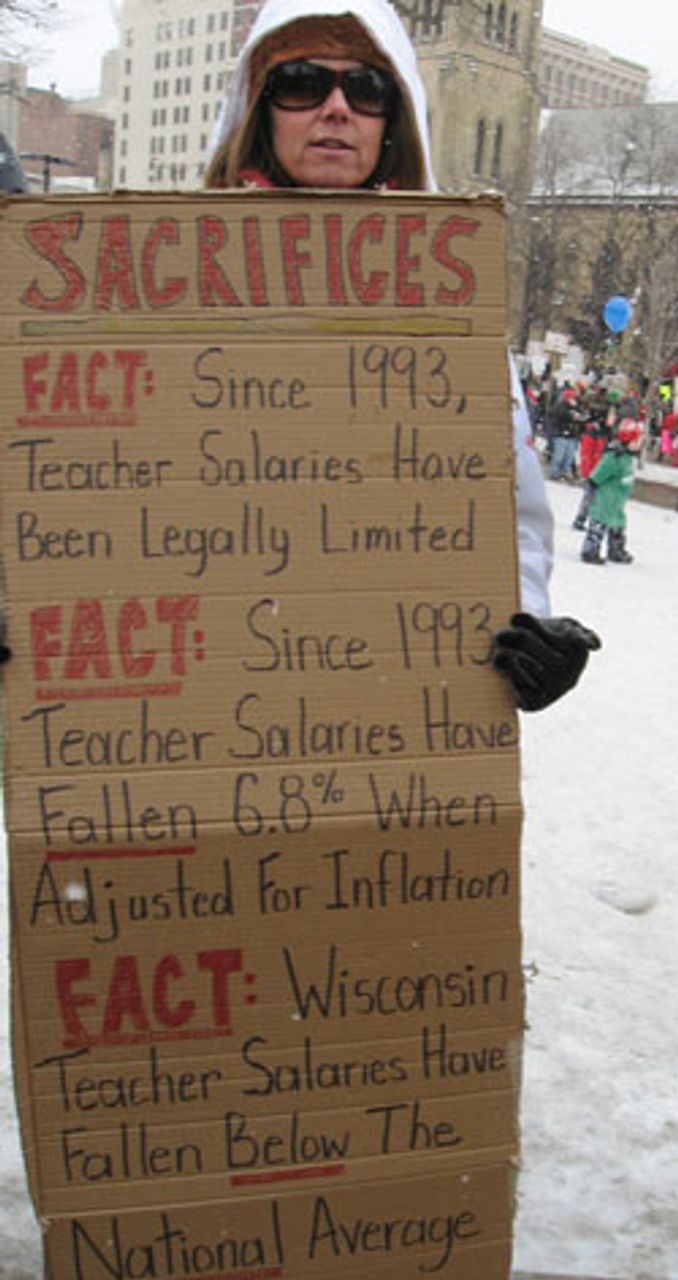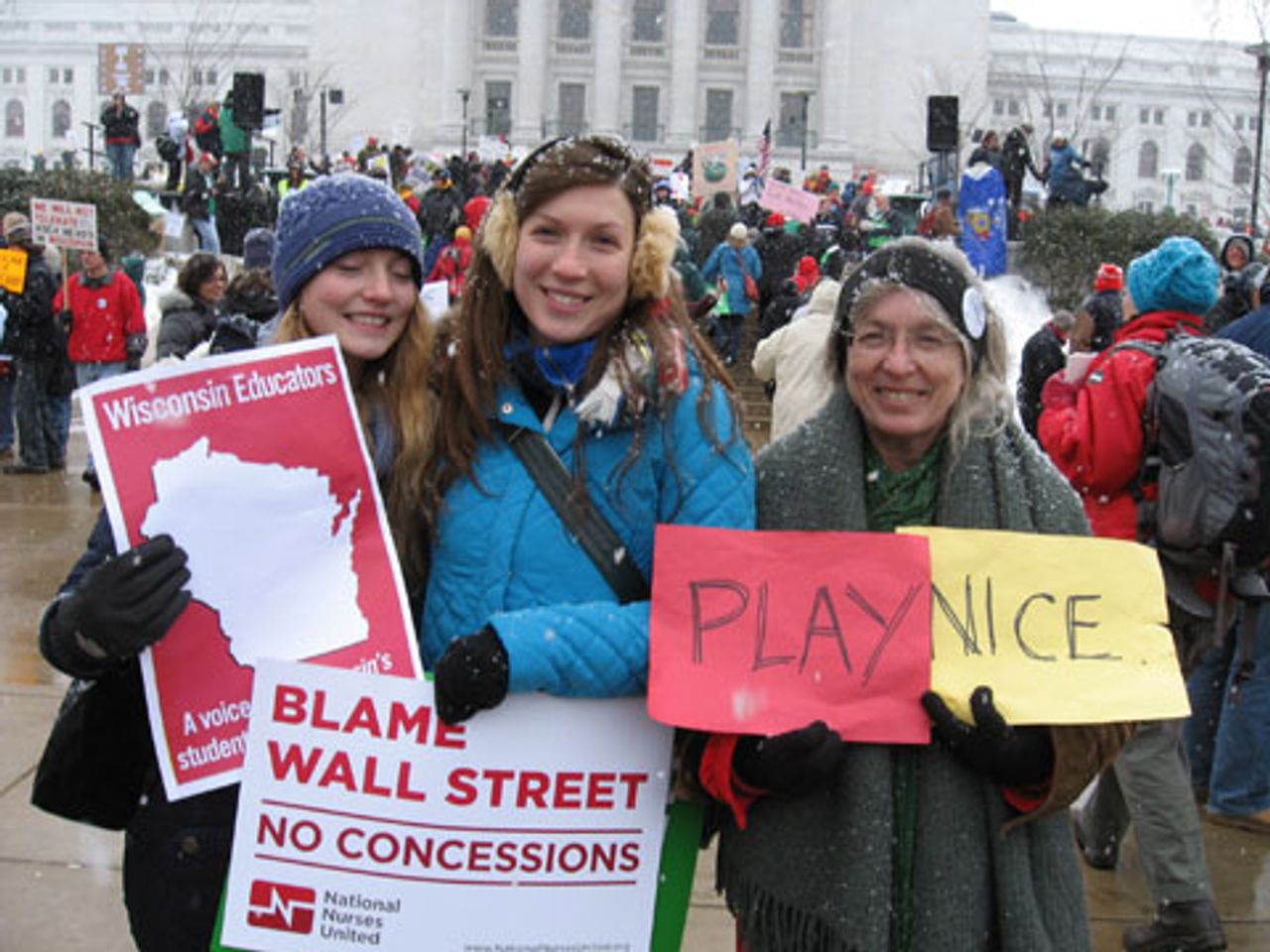Saturday’s demonstration in Madison against attacks on public employees was the largest of nearly two weeks of consecutive protests and continuous occupation of the state capitol building. At its peak in the afternoon, upwards of 100,000 demonstrators braved bitterly cold and snowy weather, completely filling the streets, sidewalks and lawn on Capitol Square, overflowing into side streets and packing to capacity the capitol itself.
The police estimate put the crowd at between 70,000 and 100,000, according to a local news report, but many demonstrators who spoke with the World Socialist Web Site said it was far larger than the previous Saturday’s demonstration, which was also conservatively estimated at 70,000.
The most striking feature of the demonstration, one of the largest in the history of the state, is the enormous chasm that separates the aspirations of the protesters and the entire political establishment, from the right-wing Republican governor, Scott Walker, to the state Democrats and the trade unions. While the workers and young people are fighting against vicious attacks on their living standards, social services and democratic rights, the trade union officials have already accepted all of Walker’s economic demands. They are focusing entirely on preserving the legal status of the unions to negotiate concessions and collect union dues.
This reporter noticed that, outside of several thousand people who crowded directly underneath the speakers’ stage, few appeared to be paying much attention to the speeches, which began at 3:00 in the afternoon. Upon asking, no one interviewed was able to say who was speaking or what they were saying.
Had they listened carefully, a sharp warning was implicit in the words of the union officials who dominated the speakers’ platform Saturday. Not one speaker who addressed the crowd offered even the semblance of a plan for the coming days, much less a perspective. Behind the scenes, the union heads and the Democratic Party are preparing to put an end to the struggle in Wisconsin, which they fear could escape their control and take a politically independent direction.
The speakers repeatedly encouraged demonstrators to “call and email their senators and representatives,” as put by Mary Bell, the head of the Wisconsin Education Association Council. They insisted again and again that all workers want are “collective bargaining rights” and that they will accept the wage cuts imposed by the Walker bill. Bell ordered teachers back to work last week in a sign of “good will” to Walker and the Republicans.
The speakers led the crowd in chants and made numerous jokes. The unserious mood of the union executives stood in stark contrast to the determined and angry faces teeming in the square below.
 Stacey Chiae holds a sign listing the many
Stacey Chiae holds a sign listing the manywage cuts teachers have taken in recent
years
Brian and Stacey Chiae are two veteran schoolteachers from Kenosha, Wisconsin. “A lot hangs in the balance here,” Brian told the WSWS. “To me this all started back in the days of Reagan with trickle-down economics. Everything is going to the hands of the people at the top. The corporations are seeing record profits.” Stacy added that the arrogance of the rich and powerful enrages her. “They’re laughing at us while they squeeze more and more,” she said.
“We used to think that teachers have a decent standard of living, that with globalization at least they couldn’t ship our jobs overseas because you can’t ship kids overseas,” Brian said. “But at the end of it all, they’re going after everybody, and now especially teachers.”
When asked what they thought would happen next, Brian said, “The bill will pass. Then the important moment will come. Teachers will either accept it, or there will be a big strike. I hope that Walker woke up a sleeping giant.”
Georgia Vaughn is a computer programmer at the University of Wisconsin who attended the demonstration with her two daughters, Gail Vaughn and Clara Beyer. Gail is a sophomore at the University of Wisconsin, and Clara is about to start graduate school there.
“My wages have been going down for years,” Georgia said. “Anything that asks for us to take more cuts is not acceptable.”
 Right to left: Gail Vaughn, Clara Beyer and Georgia Vaughn
Right to left: Gail Vaughn, Clara Beyer and Georgia VaughnClara said she rejects the idea that there’s not enough money to pay decent wages to government workers and fund basic programs. “Tax the rich!” Georgia interjected. Gail then pointed to the cost of the US military and the wars in Iraq and Afghanistan.
“The federal budget plan cuts $75 million from Planned Parenthood,” Gail said. “That’s the same as the cost of funding the wars in Afghanistan and Iraq for three and a half hours.”
James Keach is a laid-off autoworker who lost his job when the Janesville, Wisconsin, General Motors assembly plant was shut down as a result of the Obama administration’s forced reorganization of GM. He was in attendance at the rally with his wife Jennifer Keach, a local government worker.
 James and Jennifer Keach stand at either end
James and Jennifer Keach stand at either endJames said, “This isn’t about public sector workers or private sector workers. It’s about all workers.”
“It’s about the right to a decent wage,” Jennifer added. She said she is angry that government workers are accused of being privileged. “Where I work as a nurse in a coroners’ office, our office goes 24 hours a day and 365 days a year.”
James said he agreed—based on bitter experience in the auto industry—that the struggle of workers and youth in Wisconsin cannot be left in the hands of the trade union officials and the Democratic Party.
John Kuesch is a public defender who was at the capitol demonstrations with his wife, Elie Squire, and their daughter, a kindergarten teacher in a public school who declined to give her name for fear of retaliation by the school district. John and his daughter said they disagree with the unions’ and Democrats’ claim that the struggle is all about “collective bargaining,” and not about pay and conditions.
“I work 60 hours a week and pay out of my own pocket to supplement materials from the classroom that have been cut in previous budgets,” the kindergarten teacher said. “There is absolutely enough money, when 10 percent of the population owns 90 percent of the wealth.”
John said, “They keep saying that this isn’t about the money, but if you look at a lot of the people here, it really is about the money. People have mortgages, they have bills, they have to put their kids through school, and they can’t take any more pay cuts.”
 Bev
BevScott is an undergraduate at the University of Wisconsin who was attending the demonstration with a group of six friends. He said that his parents were both laid off earlier in the day, along with most of the school staff at the New London public school district. The layoffs, which have occurred elsewhere in Wisconsin, will force teachers to come back—if they are rehired—on the terms of school management.
“It seems like we’re seeing a big attack on democracy here,” said Scott’s friend, Megan.
Bev is a nurse who has been laid off for two years. “I’ve been looking and looking for a job, but no one will hire me because I’m at the top of the pay scale,” she said. “I’ve sent applications out over the 50 states. I’m a good nurse and an experienced nurse.”
